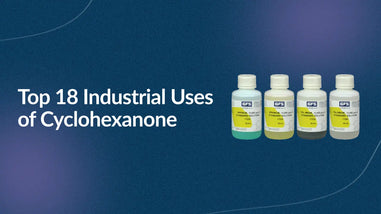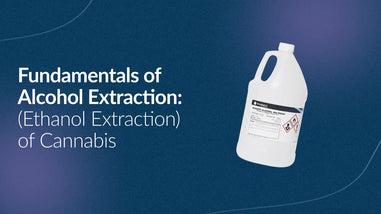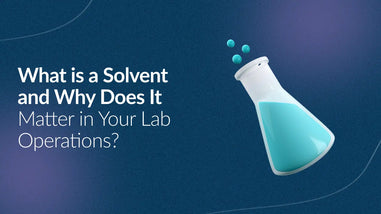- No products in the cart.
From steel mills to biotech cleanrooms, few chemicals are as quietly indispensable as hydrochloric acid. This strong, clear, and colorless acid plays a vital role in global manufacturing and laboratory work. Its versatility makes it one of the most used industrial chemicals today.
Hydrochloric acid is essential in chemical production, wastewater treatment, food processing, lab calibration, and equipment maintenance. It’s highly corrosive. This means that industries handling it must follow strict safety and compliance standards, including EPA, OSHA, and ISO regulations.
In this article, we’ll explore the five most important hydrochloric acid uses and why purity, precision, and compliance are key to getting the best performance from this powerful chemical.
Key takeaways:
-
Hydrochloric acid is one of the most widely used and versatile industrial chemicals in the world.
-
It plays a critical role in metal cleaning, pH control, chemical manufacturing, and laboratory testing.
-
Proper handling and compliance with EPA, OSHA, and ISO standards are essential for safety.
-
Purity and concentration levels determine the acid’s performance and suitability for each application.
-
Modern industries use hydrochloric acid recovery and monitoring systems to improve efficiency and sustainability.
-
Using Vendor Managed Inventory (VMI) ensures a consistent, safe, and compliant chemical supply.
What Is Hydrochloric Acid?
Hydrochloric acid, or HCl, is a strong, clear, and highly corrosive acid made by combining hydrogen and chlorine gases. It becomes a powerful solution known as HCl (aq) when dissolved in water. It’s colorless, has a sharp, pungent smell, and reacts quickly with metals, carbonates, and organic materials. Because it fully separates into hydrogen and chloride ions in water, it’s classified as a strong acid.
Hydrochloric acid is produced industrially through the direct synthesis of hydrogen and chlorine gas. Depending on its use, it’s typically available in concentrations between 10% and 37%. Lower concentrations are used in labs or food processing, while higher ones are common in industrial settings.
Due to its corrosive nature, handling hydrochloric acid requires personal protective equipment (PPE), including gloves, goggles, and chemical-resistant clothing. It must also be stored in corrosion-resistant containers away from metals and oxidizing agents. The EPA classifies hydrochloric acid as a hazardous substance, meaning strict guidelines apply to its storage, transport, and disposal.

Lab Pro’s hydrochloric acid is ideal for industrial and laboratory applications that demand precision, purity, and compliance. It delivers consistent pH control, metal treatment, and analytical testing performance.
Top 5 Industrial And Laboratory Uses Of Hydrochloric Acid
Hydrochloric acid is one of the most widely used chemicals in the world. Its strong reactivity and ability to dissolve metals, neutralize bases, and control pH make it an important component across industries.
Below are the top five hydrochloric acid uses that show just how versatile and valuable this chemical is in both industrial and scientific applications.
Steel Pickling and Metal Surface Preparation
One of the main uses of hydrochloric acid is steel pickling. This is a process during which metal surfaces are cleaned before further treatment. In this process, steel is dipped into a hydrochloric acid solution (around 18–20% concentration) to remove rust, scale, and other impurities. This cleans the surface, and now it is ready for coating, plating, or fabrication.
Hydrochloric acid is preferred over sulfuric acid because it works faster, produces less fume, and is easier to control during processing. It also creates byproducts, like ferrous chloride (FeCl₂), that can be recycled or reused, making the process more sustainable.
Industries such as aerospace, automotive, and precision manufacturing rely on hydrochloric acid for surface preparation. Clean, oxide-free metal helps improve coating adhesion, corrosion resistance, and overall product quality. Many facilities now use acid regeneration systems to recover and reuse hydrochloric acid. This helps them to cut down on waste and meet environmental standards.
Choosing the right acid strength and maintaining consistent concentration can be very helpful. With this, you can increase production efficiency, reduce waste disposal costs, and help keep operations safe and compliant.
pH Control and Neutralization
Another important use of hydrochloric acid is pH control and neutralization. Hydrochloric acid reacts with alkaline (basic) substances to form water and neutral salts, helping restore pH levels to a safe and balanced range.
-
Wastewater treatment: Used to lower the pH of alkaline water before discharge, ensuring compliance with EPA regulations.
-
Cooling towers and pipelines: It prevents scaling and corrosion by maintaining stable water chemistry.
-
Pharmaceutical and food production: Provides precise pH control to maintain product quality, consistency, and process safety.
Using the right amount of acid keeps systems efficient and extends equipment life. Many modern facilities now use automated dosing systems that monitor pH levels and adjust HCl flow automatically. This system helps to reduce operator exposure, waste, and ensure accuracy during treatment.
Hydrochloric acid plays a key role in environmental protection and long-term operational reliability by keeping water systems balanced and compliant.
Chemical Manufacturing And Synthesis
Hydrochloric acid is one of the most important building blocks in chemical manufacturing. Around 30% of HCl produced in the US goes into making other chemicals that power everyday products and industrial processes.
In organic synthesis, hydrochloric acid is used to produce key materials like vinyl chloride (for PVC plastics), bisphenol A (for polycarbonate), and various chlorinated solvents. These chemicals are used in cleaning and degreasing and are essential in construction, electronics, and automotive manufacturing.
In inorganic synthesis, hydrochloric acid helps make compounds such as ferric chloride, poly-aluminum chloride, and titanium tetrachloride. These are used in water treatment, pigments, and coatings.
Hydrochloric acid also plays a role in closed-loop industrial processes, such as regenerating ion-exchange resins, preparing catalysts, and acidifying chemical reactions. These applications keep production lines efficient and prevent material buildup that can affect product quality.
Purity is critical in these industries. Reagent-grade and semiconductor-grade hydrochloric acid are used when even trace contamination can ruin a batch, especially in biotech, pharmaceutical, and electronics manufacturing.
Consistent purity protects quality, affects yield, safety, and regulatory approval. Using verified, high-grade hydrochloric acid helps companies comply with global standards.

Laboratory Applications And Analytical Chemistry
Hydrochloric acid is one of the most common and dependable acids in laboratories. It is used for testing, calibration, and sample preparation. It plays a central role in titrations, digestions, and pH standardization, helping scientists achieve accurate and repeatable results.
Due to its strong and stable acidity, hydrochloric acid helps maintain consistent conditions in chemical and biological assays. It ensures reagent stability, supports precise concentration control, and helps keep the integrity of analytical methods.
High-purity grades of HCl are also used in cleanroom environments within ISO Class 5–8 standards, where even tiny contaminants can affect sensitive research or production. It’s commonly used to clean and calibrate glassware and instruments in life sciences, semiconductor R&D, and materials testing.
For delicate applications, trace analysis, or low-metal grade hydrochloric acid is preferred. It minimizes the risk of measurement drift and sample contamination, which is crucial in regulated labs.
Laboratories handling hydrochloric acid should follow strict safety and compliance protocols, including SDS documentation and chemical hygiene plans under OSHA 1910.1450. When handled correctly, hydrochloric acid remains one of the most versatile and reliable tools in modern analytical chemistry.
Oil And Gas Production
In the energy industry, hydrochloric acid plays a great role in oil and gas extraction. This process is called acidizing. This method involves pumping hydrochloric acid into rock formations to dissolve minerals like limestone and dolomite. This helps open up channels for oil and gas to flow more easily.
The acidizing solution typically contains 15–28% hydrochloric acid, depending on the type of rock and well depth. By improving rock permeability, this process increases production efficiency and extends the life of the well.
Beyond extraction, hydrochloric acid is also used in maintenance operations to clean equipment, pipelines, and drilling tools by removing mineral buildup and rust. Thanks to its reactivity, it is highly effective for dissolving stubborn deposits that can slow production.
Today, many companies are moving toward closed-loop acid handling systems and neutralization methods. With this, they try to minimize environmental impact and ensure safe disposal. These systems capture and recycle spent acid, reducing waste and improving sustainability.
As global energy operations shift toward cleaner practices, hydrochloric acid continues to support production in a safer and more efficient way. Its controlled use is still a key part of the balance between industrial performance and environmental responsibility.
Safety, Storage, And Compliance
Hydrochloric acid is a powerful and essential industrial chemical, yet it must be handled with care. Proper handling, storage, and documentation protect people and equipment and help labs meet strict environmental and safety standards.
-
Handle with care: Hydrochloric acid is highly corrosive and must always be used with caution.
-
Wear PPE: Use gloves, goggles, face shields, and respirators when handling the acid.
-
Use proper containers: Store in PVC, polyethylene, or other corrosion-resistant materials.
-
Avoid incompatible materials: Avoid metals, oxidizers, and organic compounds. This will help prevent hazardous reactions.
-
Follow regulations: Comply with EPA, OSHA, and ISO 14001 standards for handling, storage, and environmental safety.
-
Maintain documentation: Keep Safety Data Sheets (SDS) and ensure proper labeling for all containers.
-
Work with reliable suppliers: Choose vendors who verify purity, ensure safe packaging, and meet regulatory labeling standards.
-
Use VMI programs: Vendor-managed inventory (VMI) helps track usage, monitor storage levels, and restock in approved volumes, reducing risks of overstocking or accidental exposure while keeping operations compliant.
Choosing The Right Grade Of Hydrochloric Acid
Not all hydrochloric acid is the same. Choosing the right grade is essential for safety, performance, and compliance. Each grade is unique and designed for specific uses and purity requirements.
-
Technical Grade: Used in industrial applications like steel pickling, cleaning, and pH control. It offers good performance for general manufacturing needs.
-
Food Grade: Used in food and pharmaceutical production where safety and purity are critical, and must meet strict certifications and quality standards.
-
Reagent Grade: Ideal for analytical and laboratory work where high precision and low contamination are required.
-
Semiconductor or Trace-Metal Grade: Used in electronics and biotech industries where even trace impurities can affect results or product quality.
Hydrochloric acid (HCl) is one of the most versatile chemicals used across industries. Its precision and reactivity also make it an essential acid in laboratories.
In lab environments, hydrochloric acid is used for:
-
Analytical testing: Ideal for titrations, pH standardization, and sample preparation.
-
Chemical synthesis: A key reagent in producing and purifying compounds.
-
Education and research: Commonly used in chemistry experiments and instructional labs.
These applications highlight why hydrochloric acid remains indispensable in both industrial processes and scientific research.
Lab Pro supplies high-quality hydrochloric acid in various grades and sizes to meet your exact needs. To keep your operations running smoothly, our Vendor Managed Inventory (VMI) program ensures a steady supply of essential chemicals without the risk of stockouts.
Explore our full solvent selection here.
FAQs
Are there emerging “hydrochloric acid uses” I should be aware of in advanced manufacturing?
Yes, beyond traditional uses, newer applications include battery-materials recycling (e.g., lithium extraction), semiconductor cleaning (ultra-high-purity HCl), and closed-loop processing in clean energy manufacturing. These evolving uses demand higher levels of purity, traceability, and regulatory documentation.
How does supplier quality affect “hydrochloric acid uses” in regulated industries?
In regulated sectors (pharmaceuticals, biotech, aerospace), the outcomes of your “hydrochloric acid uses” depend heavily on supplier quality: you need full Certificates of Analysis (CoA), lot traceability, compliant packaging, and documentation (REACH, GHS). Any impurity or documentation gap can impact product quality, audit readiness, and operational uptime.
How does sustainability tie into “hydrochloric acid uses” in modern operations?
Sustainability is now a key factor in many “hydrochloric acid uses.” For example, steel pickling increasingly uses acid-regeneration systems to recycle HCl, reducing waste and costs. Similarly, closed-loop neutralization and recovery systems are deployed in water treatment and chemical manufacturing to meet environmental and regulatory goals.
How can my facility scale and monitor hydrochloric acid use to reduce risk?
For large-scale “hydrochloric acid uses,” adopting digital monitoring (e.g., automated dosing, sensors) paired with a Vendor Managed Inventory (VMI) program helps track acid volumes, storage conditions, and usage patterns. This supports safety compliance, avoids overstocking, and helps audit readiness for chemical handling.












































